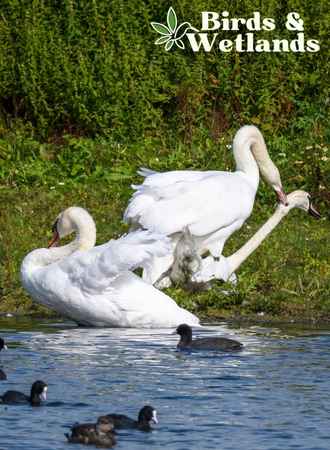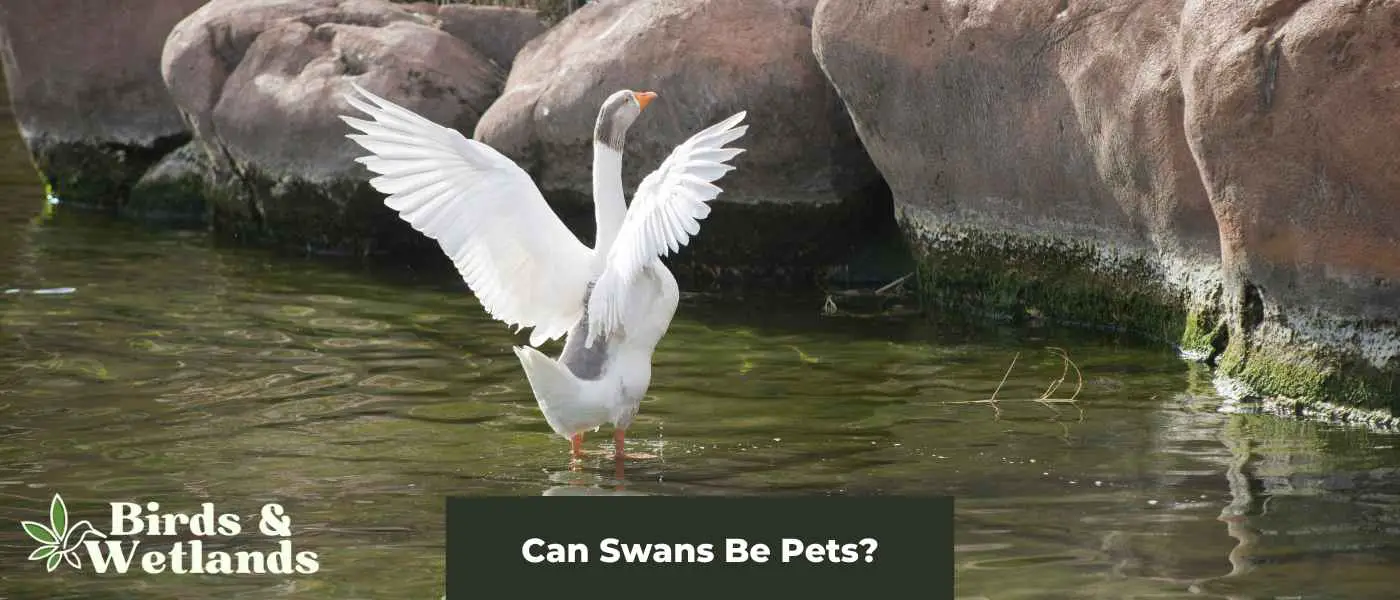Swans are majestic birds known for their graceful movements and elegant appearance. Their long necks and snow-white feathers make them a sight to behold on any body of water. These birds have a strong territorial instinct and are highly protective of their young, making them fascinating creatures to observe. But can these beautiful birds be kept as pets?
The question of whether or not you can own swans as pets is a challenging one to answer. It is possible to own swans in many places, but certain laws and regulations must be followed. Additionally, swans require a significant amount of space and care, making them a big responsibility.
In this post, we will dive into the specifics of owning swans as pets. We will discuss the legal requirements, housing needs, and daily care that comes with keeping these birds. If you’re considering owning a swan, we encourage you to read the entire blog post.
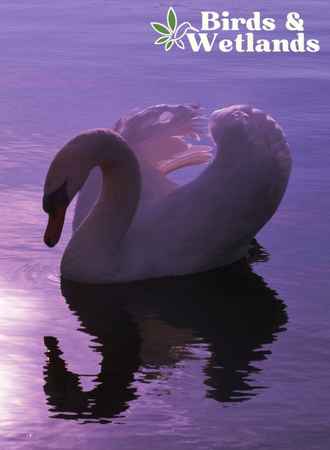
Key Takeaways on Keeping Swans as Pets
- In many jurisdictions, people can own swans as pets.
- Owning swans as pets comes with plenty of responsibilities and ethical dilemmas.
- Most swans are aggressive birds, so it’s not such a great idea to own them as pets.
Can I keep a swan as a pet?
Yes, you can own a swan as a pet, provided that the place you live in permits it. However, the more important question you should ask is, should I own a swan as a pet?
Swans have long been admired for their beauty and grace, so many people have considered keeping these graceful birds as pets. However, several ethical dilemmas come with keeping swans as pets.
Swan lovers should know that one of the main ethical dilemmas of keeping swans as pets is that they are wild animals and are not meant to be held in captivity.
Most swans are migratory birds, and in the wild, they travel long distances and live in large flocks. Keeping them in captivity can be detrimental to their health and well-being.
Another ethical dilemma is that swans are often taken from the wild to be sold as pets. This can disrupt the natural balance of populations and also harm the individual birds that are taken. Some people even keep swan eggs and hatch them, which is downright cruel to parent swans.
In addition, swans may not be properly cared for by people who do not have the knowledge and experience necessary to meet their needs. For instance, black swans are popular as ornamental birds. However, not many people know that the black swan doesn’t do well in cold weather.
Additionally, getting one swan is not ideal since these birds form monogamous pairs, so you need to get two swans, especially if you plan to raise cygnets.
It’s also important to note that many places have laws to protect swans, and keeping wild birds and exotic pets, such as black-necked swans, violates these laws. You can own a mute swan in some states since it is not a native species. Keep in mind that swans fly, so you need to have its wings clipped at the pet store so it won’t fly.
Remember that tundra and trumpeter swans are protected under the Federal Waterfowl Act and the Migratory Bird Treaty Act. Whooper swans, which are visitors in Alaska, are also protected. If you are determined to own a swan, make sure you call your local wildlife authority.
Most swan species can also be aggressive and territorial, which may become problematic in a domestic setting.
On a positive note, some people are adopting swans from animal sanctuaries or rescue organizations, which provide care and protection for swans that have been injured, abandoned or abused.
However, this is still not without ethical dilemmas, as swans may have difficulty adapting to captivity even if they are rescued from bad situations.
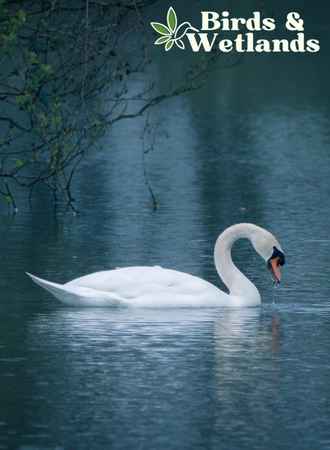
Why people don’t own swans as pets?
As migratory birds, swans cannot be kept in captivity year-round as they need to migrate and find new bodies of water. Failure to provide a pet swan with the opportunity to migrate can result in stress and anxiety, weakened immune systems, depression, and physical deformities.
Swans are territorial and can be aggressive towards intruders that come near their territory. These behaviors pose a risk to anyone around them as they may attack humans who come into their space uninvited.
Therefore, anyone considering keeping a swan as a pet should ensure they can control the bird’s behavior and keep others around the bird safe.
Keeping swans as pets is not as easy as keeping a pet dog or cat. It requires specialized knowledge and expertise to provide proper care and nutrition for these big birds, which many people need help accessing. There aren’t a lot of resources on swan breeding.
A swan eats a lot of food, about 20% to 25% of its body weight. Young and adult swans should be fed aquatic plants, insects, worms, small fish, fruit, and vegetables. Instead of bread which is often given to them by unknowing pet owners.
Owning a swan also comes with additional costs, such as buying large enclosures or ponds suitable for swimming and hiring a professional veterinary specialist knowledgeable about avian species such as domesticated swans.
Swans are loud animals that may contribute to noise pollution. So if you don’t want to deal with angry neighbors, keeping swans is not for you.
How to attract wild swans to your garden?
Instead of buying swans, you can actually attract them to your big pond. One of the best ways to attract wild swans to your garden or large pond is to provide them with a safe, attractive habitat and plenty of food.
A large, well-maintained pond or lake with plenty of native plants and aquatic animals in the vicinity that they can feed on can be the perfect home for wild swans.
Recreate the natural habitat of the swan or build a swan island with surrounding vegetation near the water. Swans live in marshy or swampy areas. To make the area more appealing and resemble their natural habitats, consider adding floating platforms or logs for them to rest on and take shelter from predators and harsh weather.
To attract swans, plant lush vegetation around your water feature and provide supplementary food sources such as birdseed.
Swans tend to graze on green foliage near the surface of rivers or lakes and often prefer a combination of aquatic weeds, grasses, and shrubs. Supplementing their diet with cracked corn, wheat grains, brown rice, sunflower seeds, millet, mealworms, insects, fruits, and vegetables can benefit their health and encourage them to stay in the area.
To attract swans, it’s important to keep the pond clean and maintain good water quality by adding aerators to oxygenate the water, which creates a healthy environment for fish and other aquatic life that form part of their diet.
Clear water free from pollutants or debris is necessary for them to stay in your garden. To maintain a healthy environment, watch for any signs of water pollution.
To bring in more feral mute swan visitors during migratory periods, consider introducing decoy ponds nearby, as they can provide much-needed food for weary migrating birds.
Another idea would be creating nesting boxes in nearby trees or within reed beds in shallow waters where they can lay eggs, which can be particularly appealing during the breeding season.
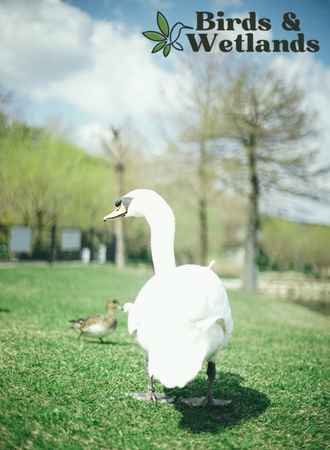
How much space do swans need?
Swans are huge birds that typically need a minimum of 4 acres of water per pair for nesting and foraging. However, the specific amount of space required can vary depending on the species of swan and the local environment. And if you have other waterfowl, they can live in the same pond, but you need to ensure ample space for these large birds, especially if you allow them to roam free.
You need a huge space for all the swans, and you need to protect them against their natural predators. Predatory animals such as raccoons, owls, foxes, eagles and minks prey on swans and other birds.
Are swans aggressive?
Swans are territorial and may become aggressively protective of their space and possessions, especially if they feel threatened.
Their aggressive behavior can manifest when humans or other animals come close to a swan’s nest or the surrounding area. They will lunge and flap their wings to ward off predators and intruders.
In some cases, swans may even attack people with long necks and sharp beaks if they feel sufficiently threatened.
The aggression of swans can vary depending on the species. For instance, mute swans tend to be more cautious around people than trumpeter swans and, thus, more likely to react defensively.
Additionally, some individual swans may exhibit more aggressive traits than others due to hormones or genetics.
Swans can also be hostile toward other animals that enter their territory, including birds of prey such as hawks, eagles, and owls. They will use their wings to form a barrier around their nests, attacking potential intruders with loud hissing noises and threats.
Male swans may also fight each other for access to food or breeding grounds, becoming increasingly competitive during mating season.
Moreover, the male swan is very protective of its female swan and baby swan so it will not hesitate to attack anything or anyone that approaches its nest.
It is important for humans living near swans to take precautions when approaching these creatures. Not only can they attack, but they can also transmit diseases such as avian botulism. These diseases can be spread or contracted through contaminated water sources or food that affected birds have ingested.
